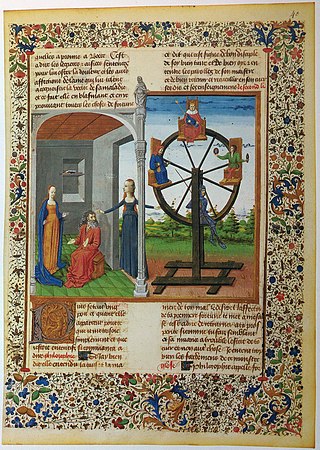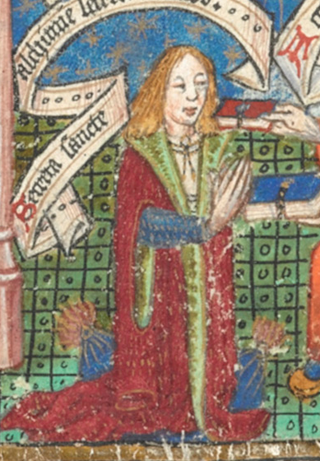Works
Walton appears to have been a canon of Osney Abbey in 1410, when he completed his verse-translation of the De Consolatione Philosophiæ of Boethius. This work was undertaken at the request of Elizabeth Berkeley; she, possibly, was the daughter of Thomas de Berkeley, 5th Baron Berkeley, patron of John de Trevisa, who married Richard de Beauchamp, 13th Earl of Warwick. Boethius's work had already been translated into English prose as Geoffrey Chaucer's Boece , and Walton makes use of Chaucer's version. He refers to Chaucer as "the floure of rethoryk", and also mentions John Gower. [2]
Ten manuscripts of Walton's translation are extant. [3] Walton's book was printed in 1525. [4] Extracts from Walton's poem were printed in Wülker's Altenglisches Lesebuch (ii. 56), in Skeat's edition of Chaucer (vol. ii. pp. xvi–xvii), and in the Athenæum (1892, i. 565). [2]

On the Consolation of Philosophy, often titled as The Consolation of Philosophy or simply the Consolation, is a philosophical work by the Roman statesman Boethius. Written in 523 while he was imprisoned by King Theodoric, it is often described as the last great Western work of the Classical Period. Boethius' Consolation heavily influenced the philosophy of late antiquity, as well as Medieval and early Renaissance Christianity.
Alfred of Sarashel, also known as Alfred the Philosopher, Alfred the Englishman or Alfredus Anglicus, was born in England some time in the 12th century and died in the 13th century.

Thomas Hoccleve or Occleve was an English poet and clerk, who became a key figure in 15th-century Middle English literature. His Regement of Princes or De Regimine Principum is a homily on virtues and vices, written for Henry V of England shortly before his accession.

Thomas Norton was an English poet and alchemist best known for his 1477 alchemical poem, The Ordinal of Alchemy.
The Lady Margaret Professorship of Divinity is a senior professorship in Christ Church of the University of Oxford. The professorship was founded from the benefaction of Lady Margaret Beaufort (1443–1509), mother of Henry VII. Its holders were all priests until 2015, when Carol Harrison, a lay theologian, was appointed to the chair.

Elizabeth de Berkeley, Countess of Warwick and Baroness Lisle, was an English noblewoman and heiress. She was the only child of Thomas de Berkeley, 5th Baron Berkeley, and Margaret de Lisle, 3rd Baroness Lisle.
John surnamed Galensis, Walensis or Wallensis, was a Welsh canon law jurist.
John Walton was an English canon regular who became Archbishop of Dublin.
Walford Dakin Selby (1845–1889) was an English archivist and antiquary.
Thomas Sprott or Spott was an English Benedictine chronicler, a monk of St Augustine's Abbey, Canterbury.
The Old English Boethius is an Old English translation/adaptation of the sixth-century Consolation of Philosophy by Boethius, dating from between c. 880 and 950. Boethius's work is prosimetrical, alternating between prose and verse, and one of the two surviving manuscripts of the Old English translation renders the poems as Old English alliterative verse: these verse translations are known as the Metres of Boethius.
Thomas Speght was an English schoolmaster and editor of Geoffrey Chaucer.
Henry Scogan (c.1361–1407) was an English poet and royal tutor.
Simund de Freine was an Anglo-Norman cleric and poet. He was a canon of Hereford Cathedral and a friend of Giraldus Cambrensis.

John Shirley was an author, translator, and scribe. As a scribe of later Middle English literature, he is particularly known for transcribing works by John Lydgate and Geoffrey Chaucer.
William of Wheatley or Whetley was an English divine, schoolmaster and author. He studied at Oxford and possibly Paris; became a schoolmaster; was made rector of Yatesbury; and wrote philosophical and other works.
William, later called William the Trouvère, was an English poet. He translated tales from the Latin Miracles of the Virgin into Anglo-Norman verse.
This page is based on this
Wikipedia article Text is available under the
CC BY-SA 4.0 license; additional terms may apply.
Images, videos and audio are available under their respective licenses.
![]() This article incorporates text from a publication now in the public domain : Lee, Sidney, ed. (1899). "Walton, John (fl.1410)". Dictionary of National Biography . Vol. 59. London: Smith, Elder & Co.
This article incorporates text from a publication now in the public domain : Lee, Sidney, ed. (1899). "Walton, John (fl.1410)". Dictionary of National Biography . Vol. 59. London: Smith, Elder & Co.



